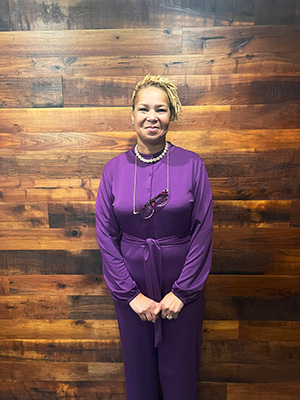Children Can Be Heroes Too

Reflecting on the initial diagnosis, Shaunell said, “It was a shock but a relief.” Though November was the family’s first time living closely with a relative who was blind, they quickly began taking steps to learn what Septo-Optic Dysplasia was and how to make life adaptable for a young child navigating blindness.
November was the first grandchild to give Shaunell the grandmother title “Boo-ma.” A befitting name, since childhood, Shaunell’s family has referred to her as “Shaunie-boo.” But the grandmother-granddaughter duo share a special bond beyond blood. Over the past four years, Shaunell has progressively started to lose her vision in both eyes.
“It was the right first, then the left,” Shaunell retold her story. In her late 20s, she was diagnosed with diabetes. She knew she had to take medication. And she knew she had to maintain a healthy diet and exercise. Shaunell also knew at times, she wasn’t caring for herself; instead, she focused on caring for others.
Nearly two decades go by after her diabetes diagnosis – November and her little brother August are born; Shaunell notices floaters in her eye and is warned to get her A1C under control; she marries her husband, Jeffery, and changes from oral medication to insulin. Then, the year 2020 arrives, and its events strike the entire world.
One day at work, everything suddenly went black, and Shaunell realized she had lost vision in her right eye. Her retina detached, and she had to go into immediate surgery. She was officially diagnosed with Diabetic retinopathy. Two years later, after getting routine eye injections, one morning, she woke up with no sight in her left eye. Once more, Shaunell found herself having to go into the emergency room to stop the hemorrhaging.
“This sent me into depression. For the first time since I was 13, I wasn’t able to work,” she recounted. Shaunell felt her independence being taken from her and was nervous about what the future held.
With guidance from her vocational rehabilitation counselor, she was accepted into the Bosma Center for Visionary Solutions rehab program. However, Shaunell was apprehensive about committing to the 16-week in-person program. Despite her initial feelings, she accepted that it was time for her to relearn what she already knew, but now, as an individual with low vision.
This was evident when, one day, she found herself unable to walk down the stairs while at an event. The venue’s lights were distracting, and the stairs blended together due to their complementary colors. Shaunell didn’t like using her cane, so it wasn’t there to help her navigate. The next day, she came to class with a different mindset. Thus, “Shelby,” her cane, was gifted a name.
In her graduation speech, Shaunell recognized her instructors, peers, and counselors for their unwavering support.
“Vocational rehabilitation has been more than just a program to me; it has been a lifeline, a beacon of hope guiding me through the darkness.”
In the midst of darkness, Shaunell was determined to get back to work. She received rejections, doubts, and news that her long-term disability benefits were coming to an end. But in early June, after a second interview in which her skills were put to the test on the spot, she was offered and accepted a position.
At the end of her graduation speech, Shaunell recognized her family and friends. But it is November, who she credited as her hero.
“When you see a child journey through their life, having to overcome major adversities, it is heroic,” Shaunell said. “She advocates, challenges, and never allows herself to feel sorry. She shows me I can do this, too.”